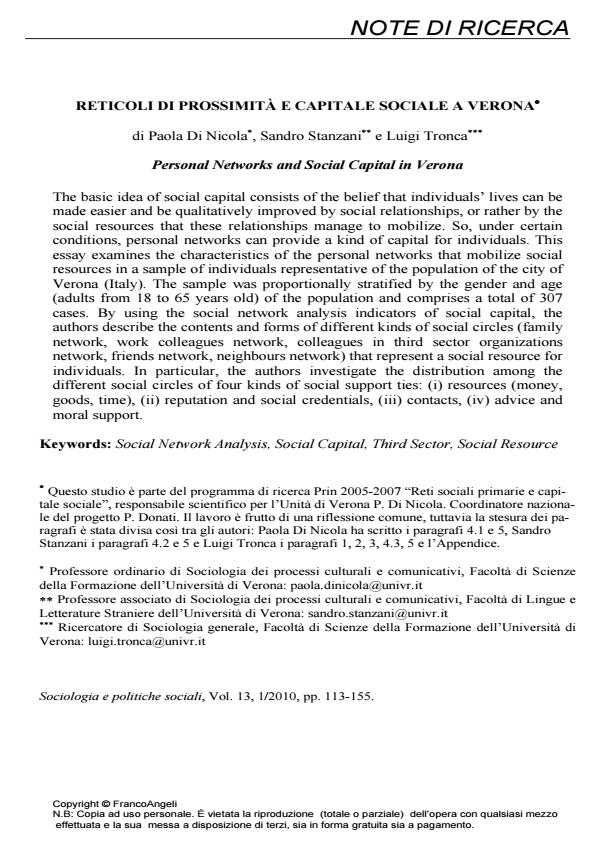Personal Networks and Social Capital in Verona
Journal title SOCIOLOGIA E POLITICHE SOCIALI
Author/s Paola Di Nicola, Sandro Stanzani, Luigi Tronca
Publishing Year 2010 Issue 2010/1 Language Italian
Pages 43 P. 113-155 File size 1942 KB
DOI 10.3280/SP2010-001006
DOI is like a bar code for intellectual property: to have more infomation
click here
Below, you can see the article first page
If you want to buy this article in PDF format, you can do it, following the instructions to buy download credits

FrancoAngeli is member of Publishers International Linking Association, Inc (PILA), a not-for-profit association which run the CrossRef service enabling links to and from online scholarly content.
The basic idea of social capital consists of the belief that individuals’ lives can be made easier and be qualitatively improved by social relationships, or rather by the social resources that these relationships manage to mobilize. So, under certain conditions, personal networks can provide a kind of capital for individuals. This essay examines the characteristics of the personal networks that mobilize social resources in a sample of individuals representative of the population of the city of Verona (Italy). The sample was proportionally stratified by the gender and age (adults from 18 to 65 years old) of the population and comprises a total of 307 cases. By using the social network analysis indicators of social capital, the authors describe the contents and forms of different kinds of social circles (family network, work colleagues network, colleagues in third sector organizations network, friends network, neighbours network) that represent a social resource for individuals. In particular, the authors investigate the distribution among the different social circles of four kinds of social support ties: (i) resources (money, goods, time), (ii) reputation and social credentials, (iii) contacts, (iv) advice and moral support.
Keywords: Social Network Analysis, Social Capital, Third Sector, Social Resource
- Cultura e benessere. Il capitale sociale della partecipazione culturale Ivana Matteucci, in SOCIOLOGIA DELLA COMUNICAZIONE 58/2020 pp.103
DOI: 10.3280/SC2019-058006
Paola Di Nicola, Sandro Stanzani, Luigi Tronca, Reticoli di prossimità e capitale sociale a Verona in "SOCIOLOGIA E POLITICHE SOCIALI" 1/2010, pp 113-155, DOI: 10.3280/SP2010-001006